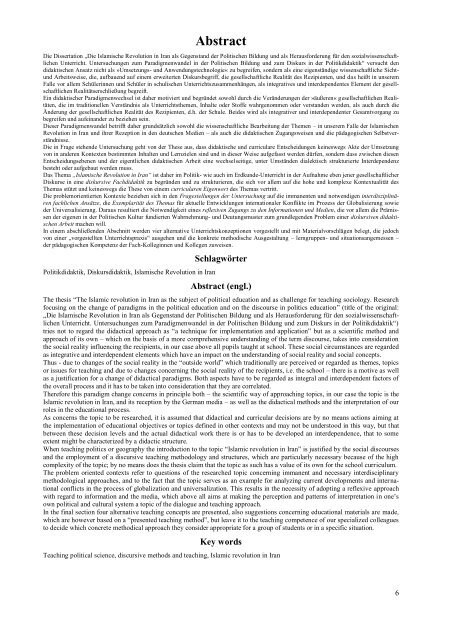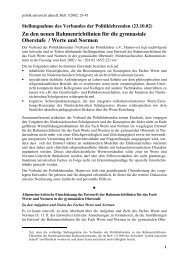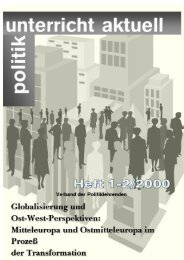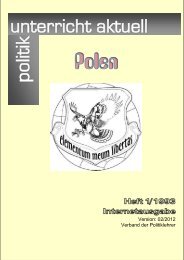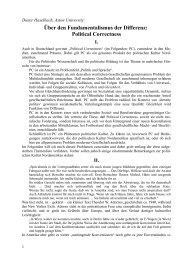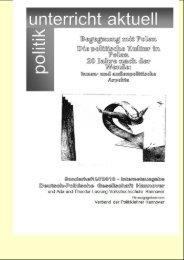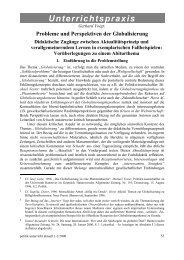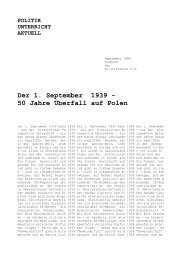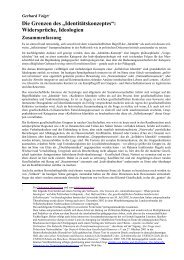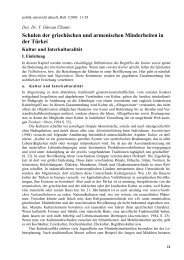Die Islamische Revolution in Iran als Gegenstand der Politischen ...
Die Islamische Revolution in Iran als Gegenstand der Politischen ...
Die Islamische Revolution in Iran als Gegenstand der Politischen ...
Erfolgreiche ePaper selbst erstellen
Machen Sie aus Ihren PDF Publikationen ein blätterbares Flipbook mit unserer einzigartigen Google optimierten e-Paper Software.
Abstract<br />
<strong>Die</strong> Dissertation „<strong>Die</strong> <strong>Islamische</strong> <strong>Revolution</strong> <strong>in</strong> <strong>Iran</strong> <strong>als</strong> <strong>Gegenstand</strong> <strong>der</strong> <strong>Politischen</strong> Bildung und <strong>als</strong> Herausfor<strong>der</strong>ung für den sozialwissenschaftlichen<br />
Unterricht. Untersuchungen zum Paradigmenwandel <strong>in</strong> <strong>der</strong> <strong>Politischen</strong> Bildung und zum Diskurs <strong>in</strong> <strong>der</strong> Politikdidaktik“ versucht den<br />
didaktischen Ansatz nicht <strong>als</strong> »Umsetzungs- und Anwendungstechnologie« zu begreifen, son<strong>der</strong>n <strong>als</strong> e<strong>in</strong>e eigenständige wissenschaftliche Sichtund<br />
Arbeitsweise, die, aufbauend auf e<strong>in</strong>em erweiterten Diskursbegriff, die gesellschaftliche Realität des Rezipienten, und das heißt <strong>in</strong> unserem<br />
Falle vor allem Schüler<strong>in</strong>nen und Schüler <strong>in</strong> schulischen Unterrichtszusammenhängen, <strong>als</strong> <strong>in</strong>tegratives und <strong>in</strong>terdependentes Element <strong>der</strong> gesellschaftlichen<br />
Realitätserschließung begreift.<br />
E<strong>in</strong> didaktischer Paradigmenwechsel ist daher motiviert und begründet sowohl durch die Verän<strong>der</strong>ungen <strong>der</strong> »äußeren« gesellschaftlichen Realitäten,<br />
die im traditionellen Verständnis <strong>als</strong> Unterrichtsthemen, Inhalte o<strong>der</strong> Stoffe wahrgenommen o<strong>der</strong> verstanden werden, <strong>als</strong> auch durch die<br />
Än<strong>der</strong>ung <strong>der</strong> gesellschaftlichen Realität des Rezipienten, d.h. <strong>der</strong> Schule. Beides wird <strong>als</strong> <strong>in</strong>tegrativer und <strong>in</strong>terdependenter Gesamtvorgang zu<br />
begreifen und aufe<strong>in</strong>an<strong>der</strong> zu beziehen se<strong>in</strong>.<br />
<strong>Die</strong>ser Paradigmenwandel betrifft daher grundsätzlich sowohl die wissenschaftliche Bearbeitung <strong>der</strong> Themen – <strong>in</strong> unserem Falle <strong>der</strong> <strong>Islamische</strong>n<br />
<strong>Revolution</strong> <strong>in</strong> <strong>Iran</strong> und ihrer Rezeption <strong>in</strong> den deutschen Medien – <strong>als</strong> auch die didaktischen Zugangsweisen und die pädagogischen Selbstverständnisse.<br />
<strong>Die</strong> <strong>in</strong> Frage stehende Untersuchung geht von <strong>der</strong> These aus, dass didaktische und curriculare Entscheidungen ke<strong>in</strong>eswegs Akte <strong>der</strong> Umsetzung<br />
von <strong>in</strong> an<strong>der</strong>en Kontexten bestimmten Inhalten und Lernzielen s<strong>in</strong>d und <strong>in</strong> dieser Weise aufgefasst werden dürfen, son<strong>der</strong>n dass zwischen diesen<br />
Entscheidungsebenen und <strong>der</strong> eigentlichen didaktischen Arbeit e<strong>in</strong>e wechselseitige, unter Umständen dialektisch strukturierte Interdependenz<br />
besteht o<strong>der</strong> aufgebaut werden muss.<br />
Das Thema „<strong>Islamische</strong> <strong>Revolution</strong> <strong>in</strong> <strong>Iran</strong>“ ist daher im Politik- wie auch im Erdkunde-Unterricht <strong>in</strong> <strong>der</strong> Aufnahme eben jener gesellschaftlicher<br />
Diskurse <strong>in</strong> e<strong>in</strong>e diskursive Fachdidaktik zu begründen und zu strukturieren, die sich vor allem auf die hohe und komplexe Kontextualität des<br />
Themas stützt und ke<strong>in</strong>eswegs die These von e<strong>in</strong>em curricularen Eigenwert des Themas vertritt.<br />
<strong>Die</strong> problemorientierten Kontexte beziehen sich <strong>in</strong> den Fragestellungen <strong>der</strong> Untersuchung auf die immanenten und notwendigen <strong>in</strong>terdiszipl<strong>in</strong>ären<br />
fachlichen Ansätze, die Exemplarität des Themas für aktuelle Entwicklungen <strong>in</strong>ternationaler Konflikte im Prozess <strong>der</strong> Globalisierung sowie<br />
<strong>der</strong> Universalisierung. Daraus resultiert die Notwendigkeit e<strong>in</strong>es reflexiven Zugangs zu den Informationen und Medien, die vor allem die Prämissen<br />
<strong>der</strong> eigenen <strong>in</strong> <strong>der</strong> <strong>Politischen</strong> Kultur fundierten Wahrnehmung- und Deutungsmuster zum grundlegenden Problem e<strong>in</strong>er diskursiven didaktischen<br />
Arbeit machen will.<br />
In e<strong>in</strong>em abschließenden Abschnitt werden vier alternative Unterrichtskonzeptionen vorgestellt und mit Materialvorschlägen belegt, die jedoch<br />
von e<strong>in</strong>er „vorgestellten Unterrichtspraxis“ ausgehen und die konkrete methodische Ausgestaltung – lerngruppen- und situationsangemessen –<br />
<strong>der</strong> pädagogischen Kompetenz <strong>der</strong> Fach-Kolleg<strong>in</strong>nen und Kollegen zuweisen.<br />
Politikdidaktik, Diskursdidaktik, <strong>Islamische</strong> <strong>Revolution</strong> <strong>in</strong> <strong>Iran</strong><br />
Schlagwörter<br />
Abstract (engl.)<br />
The thesis “The Islamic revolution <strong>in</strong> <strong>Iran</strong> as the subject of political education and as challenge for teach<strong>in</strong>g sociology. Research<br />
focus<strong>in</strong>g on the change of paradigms <strong>in</strong> the political education and on the discourse <strong>in</strong> politics education” (title of the orig<strong>in</strong>al:<br />
„<strong>Die</strong> <strong>Islamische</strong> <strong>Revolution</strong> <strong>in</strong> <strong>Iran</strong> <strong>als</strong> <strong>Gegenstand</strong> <strong>der</strong> <strong>Politischen</strong> Bildung und <strong>als</strong> Herausfor<strong>der</strong>ung für den sozialwissenschaftlichen<br />
Unterricht. Untersuchungen zum Paradigmenwandel <strong>in</strong> <strong>der</strong> <strong>Politischen</strong> Bildung und zum Diskurs <strong>in</strong> <strong>der</strong> Politikdidaktik“)<br />
tries not to regard the didactical approach as “a technique for implementation and application” but as a scientific method and<br />
approach of its own – which on the basis of a more comprehensive un<strong>der</strong>stand<strong>in</strong>g of the term discourse, takes <strong>in</strong>to consi<strong>der</strong>ation<br />
the social reality <strong>in</strong>fluenc<strong>in</strong>g the recipients, <strong>in</strong> our case above all pupils taught at school. These social circumstances are regarded<br />
as <strong>in</strong>tegrative and <strong>in</strong>terdependent elements which have an impact on the un<strong>der</strong>stand<strong>in</strong>g of social reality and social concepts.<br />
Thus - due to changes of the social reality <strong>in</strong> the “outside world” which traditionally are perceived or regarded as themes, topics<br />
or issues for teach<strong>in</strong>g and due to changes concern<strong>in</strong>g the social reality of the recipients, i.e. the school – there is a motive as well<br />
as a justification for a change of didactical paradigms. Both aspects have to be regarded as <strong>in</strong>tegral and <strong>in</strong>terdependent factors of<br />
the overall process and it has to be taken <strong>in</strong>to consi<strong>der</strong>ation that they are correlated.<br />
Therefore this paradigm change concerns <strong>in</strong> pr<strong>in</strong>ciple both – the scientific way of approach<strong>in</strong>g topics, <strong>in</strong> our case the topic is the<br />
Islamic revolution <strong>in</strong> <strong>Iran</strong>, and its reception by the German media – as well as the didactical methods and the <strong>in</strong>terpretation of our<br />
roles <strong>in</strong> the educational process.<br />
As concerns the topic to be researched, it is assumed that didactical and curricular decisions are by no means actions aim<strong>in</strong>g at<br />
the implementation of educational objectives or topics def<strong>in</strong>ed <strong>in</strong> other contexts and may not be un<strong>der</strong>stood <strong>in</strong> this way, but that<br />
between these decision levels and the actual didactical work there is or has to be developed an <strong>in</strong>terdependence, that to some<br />
extent might be characterized by a didactic structure.<br />
When teach<strong>in</strong>g politics or geography the <strong>in</strong>troduction to the topic “Islamic revolution <strong>in</strong> <strong>Iran</strong>” is justified by the social discourses<br />
and the employment of a discursive teach<strong>in</strong>g methodology and structures, which are particularly necessary because of the high<br />
complexity of the topic; by no means does the thesis claim that the topic as such has a value of its own for the school curriculum.<br />
The problem oriented contexts refer to questions of the researched topic concern<strong>in</strong>g immanent and necessary <strong>in</strong>terdiscipl<strong>in</strong>ary<br />
methodological approaches, and to the fact that the topic serves as an example for analyz<strong>in</strong>g current developments and <strong>in</strong>ternational<br />
conflicts <strong>in</strong> the process of globalization and universalization. This results <strong>in</strong> the necessity of adopt<strong>in</strong>g a reflexive approach<br />
with regard to <strong>in</strong>formation and the media, which above all aims at mak<strong>in</strong>g the perception and patterns of <strong>in</strong>terpretation <strong>in</strong> one’s<br />
own political and cultural system a topic of the dialogue and teach<strong>in</strong>g approach.<br />
In the f<strong>in</strong>al section four alternative teach<strong>in</strong>g concepts are presented, <strong>als</strong>o suggestions concern<strong>in</strong>g educational materi<strong>als</strong> are made,<br />
which are however based on a “presented teach<strong>in</strong>g method”, but leave it to the teach<strong>in</strong>g competence of our specialized colleagues<br />
to decide which concrete methodical approach they consi<strong>der</strong> appropriate for a group of students or <strong>in</strong> a specific situation.<br />
Key words<br />
Teach<strong>in</strong>g political science, discursive methods and teach<strong>in</strong>g, Islamic revolution <strong>in</strong> <strong>Iran</strong><br />
6


